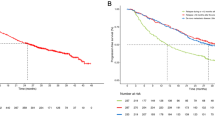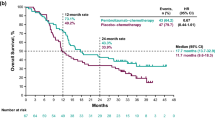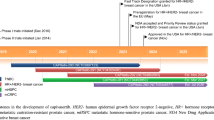Abstract
Bevacizumab (Bev) combined with chemotherapy significantly improves progression-free survival (PFS) but not overall survival (OS) in patients with human epidermal growth factor receptor 2 (HER2)-negative metastatic breast cancer (MBC). The efficacy and safety depend on the type of chemotherapy combined with Bev. We performed a meta-analysis of phase III trials to evaluate the efficacy and safety of Bev + standard chemotherapy for HER2-negative MBC. The Cochrane Central Register of Controlled Trials, the Cochrane databases, EMBASE, MEDLINE, and ClinicalTrials.gov were analyzed. The primary outcomes included PFS, OS, and toxicity. Event-based hazard ratios (HRs) and relative risks (RRs) were expressed with the 95 % confidence intervals (CIs). Four randomized controlled trials consisting of 3082 patients were included. Bev + standard chemotherapy improved PFS (HR 0.70, CI 0.64–0.77, P = 0.000) but had no effect on OS (HR 0.92, CI 0.82–1.02, P = 0.119). Bev + chemotherapy increased the incidence of febrile neutropenia (RR 1.45, CI 1.00 to 2.09, P = 0.048), proteinuria (RR 11.68, CI 3.72–36.70, P = 0.000), sensory neuropathy (RR 1.33, CI 1.05–1.70, P = 0.020), and grade ≥3 hypertension (RR 13.94, CI 7.06–27.55, P = 0.000). No differences in efficacy were observed between Bev + paclitaxel and Bev + capecitabine (Cape), but Bev + Cape increased the incidence of neutropenia. Bev + standard chemotherapy improved PFS in HER2-negative MBC patients. No benefit in OS was observed. Bev + Cape and Bev + paclitaxel had similar treatment efficacy, but Bev + Cape had a higher incidence of neutropenia.





Similar content being viewed by others
References
Jemal A et al. Global cancer statistics. CA Cancer J Clin. 2011;61(2):69–90.
DeSantis C et al. Breast cancer statistics, 2013. CA Cancer J Clin. 2014;64(1):52–62.
Mariani G. New developments in the treatment of metastatic breast cancer: from chemotherapy to biological therapy. Ann Oncol. 2005;16 Suppl 2:ii191–4.
Banerjee S et al. Mechanisms of disease: angiogenesis and the management of breast cancer. Nat Clin Pract Oncol. 2007;4(9):536–50.
Marty M, Pivot X. The potential of anti-vascular endothelial growth factor therapy in metastatic breast cancer: clinical experience with anti-angiogenic agents, focusing on bevacizumab. Eur J Cancer. 2008;44(7):912–20.
Jurgensmeier JM et al. Prognostic and predictive value of VEGF, sVEGFR-2 and CEA in mCRC studies comparing cediranib, bevacizumab and chemotherapy. Br J Cancer. 2013;108(6):1316–23.
Hoang T et al. Prognostic models to predict survival in non-small-cell lung cancer patients treated with first-line paclitaxel and carboplatin with or without bevacizumab. J Thorac Oncol. 2012;7(9):1361–8.
Bracarda S et al. Overall survival in patients with metastatic renal cell carcinoma initially treated with bevacizumab plus interferon-alpha2a and subsequent therapy with tyrosine kinase inhibitors: a retrospective analysis of the phase III AVOREN trial. BJU Int. 2011;107(2):214–9.
Zhou M et al. Phase III trials of standard chemotherapy with or without bevacizumab for ovarian cancer: a meta-analysis. PLoS One. 2013;8(12):e81858.
Goodman, A., Adding bevacizumab to adjuvant chemotherapy/trastuzumab fails to improve survival in her2-positive breast cancer. http://www.ascopost.com/issues/march-15,-2014/adding-bevacizumab-to-adjuvant-chemotherapytrastuzumab-fails-to-improve-survival-in-her2-positive-breast-cancer.aspx (2014). Accessed 12 Apr 2014.
Rossari JR et al. Bevacizumab and breast cancer: a meta-analysis of first-line phase III studies and a critical reappraisal of available evidence. J Oncol. 2012;2012:417673.
Miles DW et al. First-line bevacizumab in combination with chemotherapy for HER2-negative metastatic breast cancer: pooled and subgroup analyses of data from 2447 patients. Ann Oncol. 2013;24(11):2773–80.
Brufsky AM et al. RIBBON-2: a randomized, double-blind, placebo-controlled, phase III trial evaluating the efficacy and safety of bevacizumab in combination with chemotherapy for second-line treatment of human epidermal growth factor receptor 2-negative metastatic breast cancer. J Clin Oncol. 2011;29(32):4286–93.
Martin M et al. Motesanib, or open-label bevacizumab, in combination with paclitaxel, as first-line treatment for HER2-negative locally recurrent or metastatic breast cancer: a phase 2, randomised, double-blind, placebo-controlled study. Lancet Oncol. 2011;12(4):369–76.
Robert NJ et al. RIBBON-1: randomized, double-blind, placebo-controlled, phase III trial of chemotherapy with or without bevacizumab for first-line treatment of human epidermal growth factor receptor 2-negative, locally recurrent or metastatic breast cancer. J Clin Oncol. 2011;29(10):1252–60.
Hurvitz SA et al. A phase II trial of docetaxel with bevacizumab as first-line therapy for HER2-negative metastatic breast cancer (TORI B01). Clin Breast Cancer. 2010;10(4):307–12.
Miles DW et al. Phase III study of bevacizumab plus docetaxel compared with placebo plus docetaxel for the first-line treatment of human epidermal growth factor receptor 2-negative metastatic breast cancer. J Clin Oncol. 2010;28(20):3239–47.
Miller K et al. Paclitaxel plus bevacizumab versus paclitaxel alone for metastatic breast cancer. N Engl J Med. 2007;357(26):2666–76.
Miller KD et al. Randomized phase III trial of capecitabine compared with bevacizumab plus capecitabine in patients with previously treated metastatic breast cancer. J Clin Oncol. 2005;23(4):792–9.
Jadad AR et al. Assessing the quality of reports of randomized clinical trials: is blinding necessary? Control Clin Trials. 1996;17(1):1–12.
Therasse P et al. New guidelines to evaluate the response to treatment in solid tumors. European Organization for Research and Treatment of Cancer, National Cancer Institute of the United States, National Cancer Institute of Canada. J Natl Cancer Inst. 2000;92(3):205–16.
Tierney JF et al. Practical methods for incorporating summary time-to-event data into meta-analysis. Trials. 2007;8:16.
Higgins JP et al. Measuring inconsistency in meta-analyses. BMJ. 2003;327(7414):557–60.
Miles D et al. Using bevacizumab to treat metastatic cancer: UK consensus guidelines. Br J Hosp Med (Lond). 2010;71(12):670–7.
Broglio KR, Berry DA. Detecting an overall survival benefit that is derived from progression-free survival. J Natl Cancer Inst. 2009;101(23):1642–9.
Cameron D et al. Adjuvant bevacizumab-containing therapy in triple-negative breast cancer (BEATRICE): primary results of a randomised, phase 3 trial. Lancet Oncol. 2013;14(10):933–42.
Bramati A et al. Efficacy of biological agents in metastatic triple-negative breast cancer. Cancer Treat Rev. 2014;40(5):605–13.
Wang X et al. The efficacy of bevacizumab plus paclitaxel as first-line treatment for HER2-negative metastatic breast cancer: a meta-analysis of randomized controlled trials. Tumour Biol. 2014;35(5):4841–8.
von Minckwitz G et al. Neoadjuvant chemotherapy and bevacizumab for HER2-negative breast cancer. N Engl J Med. 2012;366(4):299–309.
Acknowledgments
This work was supported by the National High Technology Research and Development Program of China (Grant Nos. 2012AA02A502 and 2012AA02A506). The funders had no role in study design, data collection and analysis, decision to publish, or preparation of the manuscript.
Author contributions
Conceived and designed the experiments: YF, XL-Q, and BX. Analyzed the data: YF, XL-Q, YY-C, and FF-C. Performed the selection of data: YF, BR-C, and ZM-W. Wrote the paper: YF and XL-Q.
Conflicts of interest
None
Author information
Authors and Affiliations
Corresponding author
Additional information
Yuan Fang and Xinlan Qu contributed equally to this work.
Rights and permissions
About this article
Cite this article
Fang, Y., Qu, X., Cheng, B. et al. The efficacy and safety of bevacizumab combined with chemotherapy in treatment of HER2-negative metastatic breast cancer: a meta-analysis based on published phase III trials. Tumor Biol. 36, 1933–1941 (2015). https://doi.org/10.1007/s13277-014-2799-7
Received:
Accepted:
Published:
Issue Date:
DOI: https://doi.org/10.1007/s13277-014-2799-7




